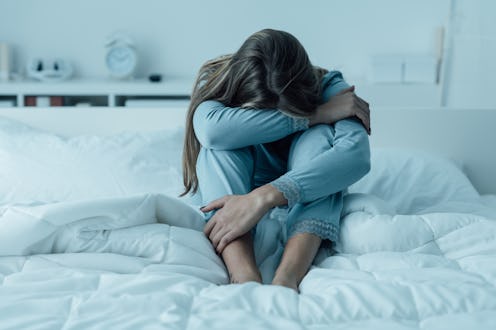
Turning back the clock seemed to hit people particularly hard last fall, so it might be useful to start gathering up some tips for Daylight Saving Time (DST) now, if you already have trouble sleeping. Whether because it truly was getting dark out earlier than usual last year, or because people are just way more vocal about their mental health struggles on social media, everybody seemed to be feeling the effects of DST ending. It's tough to stay motivated when it starts getting dark out at 4 p.m., and it's pretty demoralizing if you're one of the unfortunate souls who went to work while it was still dark out and came home after it had gotten dark again.
But the good news is, DST begins again on Mar. 10! You'll be getting way more sunlight to energize you throughout your day, but it will mean giving up an hour of sleep when the clocks change, which is enough to throw any body off for awhile. Here are some steps you can take to mitigate those issues, especially if you're already a person who already struggles with healthy sleep habits. From making a DST sleep schedule a week in advance to keeping your body's functioning regulated, these tricks will help ease the transition so you can wake up bright-eyed and ready to play in all that sunlight.
Ease Your Body Into Less Sleep
One way to prep your body for the sleep debt it's about to incur is to bank some extra sleep in the days ahead. In an email to Bustle, Dr. Michael J. Breus, a clinical psychologist who specializes in sleep disorders, suggested the following schedule for the week leading up to any DST beginning:
- on Tuesday and Wednesday, get in bed 15 minutes earlier than your normal bedtime
- on Thursday and Friday, get in bed 30 minutes earlier than your normal bedtime
- on Saturday night, get in bed 45 minutes earlier than your normal bedtime
Ration Your Caffeine Intake
Who among us hasn't fallen victim to the siren song of a late-afternoon matcha latte? To help you wind down for your earlier bedtimes in the week leading up to springing forward, Dr. Breus suggests not drinking caffeine after 1:30pm beginning the Tuesday or Wednesday before DST begins.
Avoid Alcohol
This is definitely the time to schedule that Netflix and chill weekend you've been craving. Avoiding alcohol during the weekend of the time change will help preserve the quality of your REM sleep. According to Dr. Sanam Hafeez, a New York-based neuropsychologist and faculty member at Columbia University, many people mistake the effectiveness of using alcohol as a sleep aid.
"A restful sleep is not the same as blacking out or drinking so heavily that you find yourself inebriated prior to sleep," Dr. Hafeez tells Bustle. For example, alcohol disrupts the way our body absorbs liquid, which is why you constantly wake up for water and bathroom breaks after a night of heavy drinking. Avoiding alcohol may not eliminate your sleep issues entirely, but at least you won't be adding fuel to the fire.
Stick With Your Exercise Schedule
The week leading up to DST starting again is not the time to slack off on your exercise routine. Keeping up with your regular workouts will help regulate your body and encourage it to crave sleep at bedtime.
Try Going Out Early Sunday Morning
Beat the midday rush and head out early Sunday morning for brunch instead. Making sure you get sunlight in the morning on the day of the time change will help reset your body clock, according to Dr. Breus.
Treat The Time Change Like Jet Lag
Once the time change happens, try to avoid going to sleep too early in the following week. Think of it like forcing yourself to adjust to jetlag when traveling. Be aware of your bedtime routine as the clock springs forward," Dr. Breus advises, "otherwise, you might fall back asleep at the wrong time."
Remember That The Effects Won't Last Forever
Above all, keep in mind that the effects of DST, for the most part, are temporary. Says Dr. Hafeez, "Even though disrupting the circadian rhythm can have some serious effects, most studies find that they pass during the days following a DST change."
So do your best, be gentle with yourself, and keep up with your other sleep hygiene habits. DST can be grueling on bad sleepers but it will pass eventually.